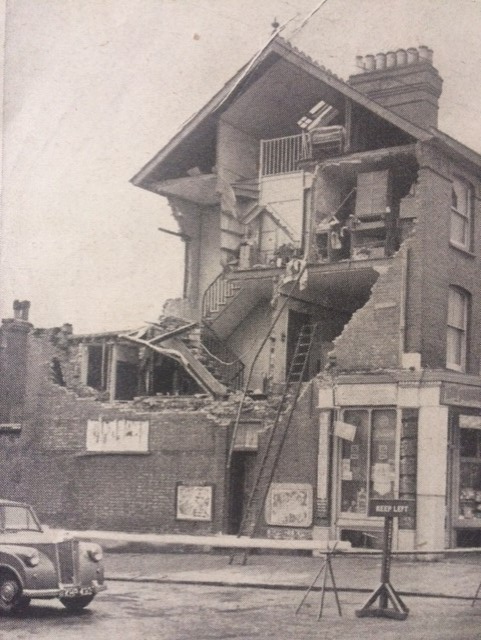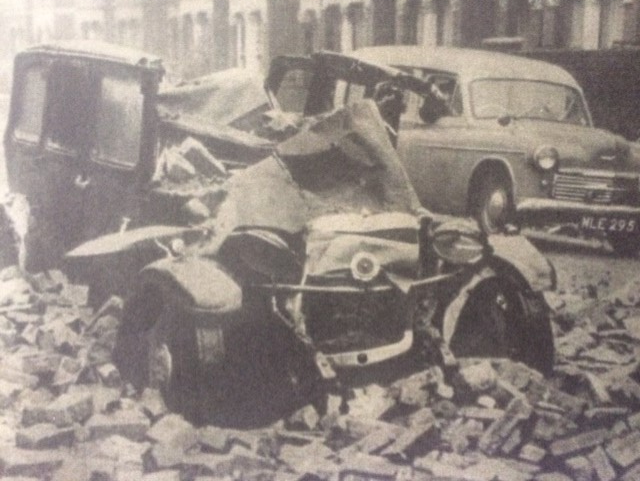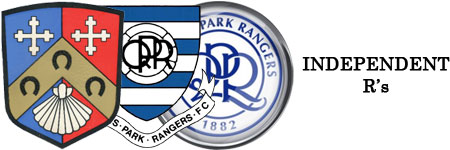‘On the evening of 8th December 1954, just before darkness fell, a violent gale, described as a “minor tornado” struck across West and North-West London, doing great damage to property and causing a number of casualties, none, however, fatal.’
The West London Observer and various other newspapers later reported on the incident:
‘Mr William Mudge, who was with his 60-year-old mother in their newsagent’s shop in Acton Vale when the whirlwind struck, said: “There was bright blue lightning and a strong wind. Then suddenly it went quiet – the calm before the storm!”
In the following minutes a roaring, whining wind shook the building, and stripped the entire side wall from the Mudge’s home. Earth, tiles, glass and even sheets of metal were whirled around in the air.
“I grabbed my mother, and we crouched in the corner of the shop while everything shook. I thought the place was coming down,” said Mr Mudge.
It was not until he went outside that he discovered how severely his house had been damaged. A man lay in the road, where he had been thrown from his cycle, and the street looked as if it had been blitzed.
Mr Joseph Coombes, a 71-year-old widower who lodged at Mrs Mudge’s house, was out when the house was struck. He returned to find the wall lying across the road and his bedroom exposed to the open air.
He stayed the night with friends, and his son travelled from Dulwich yesterday to look after him. Mr Mudge and his mother spent the night with his brother at Turnham Green.
“I’ve been back to collect some clothes, but I’ve seen nothing of the cat,” said Mr Mudge. He said that reopening the shop was “out of the question” at the moment. The shop stands at the corner of a row of six houses. All of them had their back windows blown in and roofs torn off.
Mrs Emma Holgarth, living in one of the houses, said that she suddenly felt her house shaking, and then it seemed to be spinning in the air!”
She rushed to the door, and as she did the window was blown in. The door jammed and Mrs Holgarth was forced to remain in the room until firemen released her.
On the opposite side of the road, 35 trainee nurses had just finished tea, and had left the sitting room to return to classes when the windows were smashed so forcefully that glass was embedded in a wall 15ft away.
In the classroom the girls and their tutor “sat tight” as the large group of houses known as Grafton House, the preliminary training school for nurses, was shaken and buffeted.
An official of the Ministry of Health said that damage to the building had been estimated at £3,300. He hoped that repair work would enable it to be reoccupied within a week. Complete interior decoration of the building had been finished only a few weeks ago.
The whirlwind ripped on from the road and its houses to pass across Acton Park, which it left in a litter of smashed branches, strewn timber and up rooted trees. Buildings comparatively near, yet outside the path of the storm, were unharmed.
About 500 homes, shops, factories and laundries were affected around Acton. An advertising hoarding was blown down in Larden Road. It collapsed across the footway and fell on two stationary cars.
The Mayor of Acton (Cllr. S. Rowell, JP) toured the borough, visiting families among the wreckage of their homes.

At Chiswick, the narrow path of destruction lay diagonally across the borough from the Thames, across Gunnersbury Station, where six people were injured, the Motorcraft Garage and the London Transport’s Chiswick Works.
At the Royal Standard Laundry in Bollo Lane. Two-thirds of a 90ft high chimney collapsed onto a boiler house in which four men were working. They escaped by throwing themselves against a wall as tons of brickwork fell through the roof, smashing the boiler.
And everywhere in its path, which was no more than a few yards wide, could be seen the evidence of destruction caused by the wind so feracious that it lifted whole sections of corrugated iron roofs and deposited them 50 to 100 yards away and pushed down the walls of buildings.
One of the first places to be struck in Chiswick was Gunnersbury Station, where falling pieces of corrugated iron trapped passengers waiting on the platform.
A train had just left for the West End when the whirlwind struck and ripped the roof off the waiting room and the covered footbridge which leads from the platform to the embankment.
Mrs Bell and her son David, aged four, were crossing the footbridge when the station roof collapsed. She spreadeagled herself over him. She received cuts, and her son was suffering from severe shock.
The metal uprights holding the iron roof began to sway, then the poles collapsed. Tons of iron sheeting were thrown onto the platform and railway lines. Screaming passengers were trapped underneath the debris.
Much damage was done to the Motorcraft Garage. Inside the office at the time were two people, Mr H. Beckerman, one of the two partners who own the garage, who lives in Chesterfield Road, Chiswick, and a secretary, Miss Evelyn Doble.
Mr Beckerman told a reporter yesterday that he was sure the office was going to collapse. And Miss Doble added: “In the few seconds the whirlwind lasted, the floor shuddered. We thought we had spoken our last words.”
Other parts of the garage were not so lucky. The greasing bay, where a workman had just finished work on a customer’s car, was almost demolished. The workman was lucky, as he had just left a few seconds before to clean his hands.
The corrugated iron roof was ripped off and thrown nearly 100 yards over Chiswick High Road, onto the bowling green of the L.T. Chiswick Works.
Mr G. J. Milross, who has a Newsagent’s in Chiswick High Road, described the whirlwind as “just like a mighty roar”.
After only a few seconds, when the roar had passed, he went outside to see what had happened and found debris from the station and garage lying everywhere. “It is amazing how no one was killed,” he said.
In the area covered by Chiswick Police, 13 people were reported injured, and of these only three were detained in hospital.

Three men had remarkable escapes from death when the lorry in which they were sitting, was buried beneath piles of debris from a gable end of a building.
They had stopped outside the building at the corner of Erconwald Street and Old Oak Common Lane, when the huge gable end collapsed.
The lorry was crushed beneath the weight of the debris, but of the three men in the cab, only one was seriously injured. He was Mr William McNab, of Uxbridge Road, Shepherd’s Bush, who was detained in Hammersmith Hospital with an injured back.
Hammersmith Fire Brigade were called to the premises of Messrs. Blyth and Taylor, Builder’s Merchants, whose land runs down to the L.M.S. Bakerloo electric line.
A whole line of advertising hoardings which stand opposite the 630 Trolley bus stop was lying face downwards over the pavement and underneath was a car.
In the Harrow Road, more hoardings were blown down and a light van was flung on its side in the roadway. It all bore a resemblance to the Blitz.
Yesterday morning all obstructions in the roadway had been removed, but there was a lot of tidying up still to be done off the road where the wreckage of woodwork and collapsed advertising boards bore evidence of the ravages of the wind.’
Steve Russell
(Thanks to Colin Woodley for his assistance)

Interesting article. I Was 6 years old at the time and living at 46 Askew Rd but don’t recall the event or any adults talking about it thereafter. Certainly there was no damage to our house.
Looks like nearby Acton Vale along to Acton Park took most of the hit